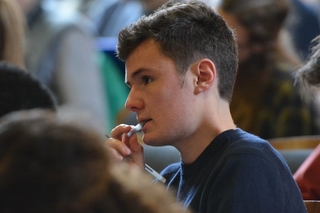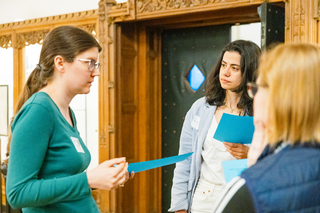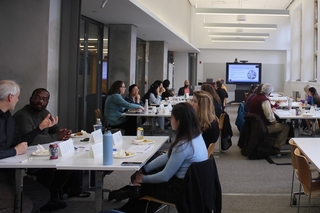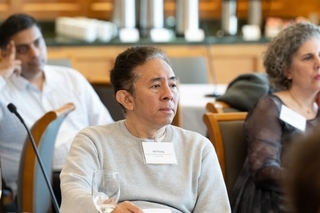Welcome to Yale! As you embark on your journey here, we are excited to help you acclimate to our campus, engage with students, staff, and fellow faculty, and gain a deep appreciation for our rich history, values, and traditions. We are delighted you have chosen to join our community where excellence, innovation, and collaboration thrive!
-
Classroom Observations and Consultations
Personalized, confidential guidance to help Yale instructors reflect on their teaching style, goals, and classroom challenges.
-
Course (Re)Design Institute
Three-day workshop with structured work time to help guide faculty in designing or redesigning new or existing courses.
-
Faculty Teaching Academy
A program for new faculty to complete within their first three years at Yale to support their development and advance their teaching.
-
Funding Opportunities
The Poorvu Center provides funding opportunities for faculty to advance their teaching.
New to Teaching at Yale? Hear What Students Have to Say
A collection of Yale graduate and undergraduate students at Yale share with new faculty some of the approaches to inclusive and equitable teaching that they have appreciated and recommend when teaching courses at Yale.
Yale College Organization & Teaching Culture
Instructors who are teaching undergraduates in Yale College should know that each of their students is affiliated with one of 14 residential colleges during their time at Yale. Each residential college includes a Head of College who is a faculty member. There is also a Residential College Dean in residence for each college who serves as the academic officer for students, reviewing their course calendars and providing Dean’s Extensions when necessary. A Dean’s Extension authorizes postponement of written work or exams in specific circumstances for an individual student; faculty are required to adhere to the Dean’s Extension and can review the process on each residential college webpage.
Yale offers over 80 different majors to undergraduates. Although Yale offers no minors, students can pursue multidisciplinary academic programs, advanced language certificates, interdisciplinary certificates, and skill-based certificates. There are no specific classes students must take at Yale, but they are required to learn broadly and deeply as part of their liberal arts education. Depth is covered in each student’s major. Breadth is covered in three study areas (the humanities and arts, the sciences, and the social sciences) and three skill areas (writing, quantitative reasoning, and foreign language).
Instructors can access information about grading policies on the Grading at Yale page.
The Sharing Student Resources page allows instructors to access information on academic, mental health, and wellness resources for students.
Course Policies & Practices
- The Handbook for Instructors of Undergraduates in Yale College describes the established procedures and rules for Yale College.
- The Yale College Programs of Study, also known as the “blue book,” provides an overview of the Yale undergraduate curriculum.
- Instructors in Yale graduate and professional schools are encouraged to consult the guides for their respective school.
- A full listing of courses can be found on Yale Course Search.
Faculty should review the Yale Faculty Handbook to learn about faculty rank, policies on research, absence and compensation.
Instructors with a primary appointment in Yale College should submit new courses to the Course of Study Committee, which meets regularly to approve courses for the fall and spring semesters. Contact your Director of Undergraduate Studies (DUS) or Chair for questions regarding course assignments and the development of new courses. The Yale Registrar’s Office provides a brief tutorial video on how to submit a new course proposal to Yale College, including cross-listing in the graduate school or other professional schools. They also provide this flow chart of the process from course concept to student enrollment.
If you are an instructor with a primary appointment in a professional school, consult with your school’s registrar for the new course process. If you teach in a professional school and want to have a new course cross-listed in Yale College, then you will need to follow the above procedures.
Classroom assignments are made by the Registrar’s Office as well as some departments. Assignments are visible the week before classes begin on Yale Course Search.
If you have specific pedagogical needs, you may apply to teach in innovative and flexible teaching spaces available across campus, including the Poorvu Center’s classroom spaces, the TEAL classroom (located at 17 Hillhouse), and the Watson Center. The Room Assignment Change Request Form can be used to apply for a change of classroom following add/drop period during the course enrollment process.
The Poorvu Center provides suggestions for how to organize your course utilizing Yale resources and policies as well as recommendations for writing a syllabus to align with Yale’s teaching culture. Consult the relevant school calendar while planning your course, such as the Yale College calendar or Graduate School of Arts and Sciences calendar, the FAS standard class meeting times, and calendar of cultural and religious observances. Specific guidance for instructors of Yale College courses with writing (WR) designations can be found here.
Instructors should post and publish their syllabus on Yale’s Learning Management System (LMS), Canvas, approximately one week prior to registration for courses; otherwise students will not be able to view the syllabus, which may lead to low enrollment. After publishing on Canvas, a link to your syllabus will appear automatically on Yale Course Search within two hours for students to view. The University Registrar’s Office and deans’ offices send out timely reminders regarding this process each semester. The Poorvu Center provides help guides for setting up your Canvas site for each of your courses.
For support with planning and ordering course materials, visit the following links:
- Ordering textbooks via the Yale Bookstore (Navigate to Textbooks, then Faculty Resources)
- Yale Library Course Reserves
- Request a Library Session for Your Students
If you are an instructor with a primary appointment in a professional school, please visit your school’s website for details on course structure and syllabus design.
Depending on your course size and type, you may have Yale students on your teaching team in roles such as Teaching Fellow (TF), undergraduate learning assistant (ULA), course-based peer tutors, and graders.
Yale provides the following Teaching Fellow Guidelines for faculty in working with graduate students serving as TFs in their courses. Experience as a TF can be a critical component of graduate education and employment, since it facilitates direct advising from a faculty member and an opportunity to teach in a collaborative environment. It also serves as professional development, whether the graduate student goes on to teach in higher education or to leverage transferable skills like communication and transparency in an industry setting.
The university also provides guidelines for working with Undergraduate Learning Assistants, Course-Based Peer Tutors, and Graders. The differences among the student course support roles are summarized in this helpful table.
Instructors teaching courses in professional schools should consult their school’s website for details on student course support roles.

“[Course (Re)Design] makes me feel that I belong to Yale University and not only to a department or lecture. Thank you!”
Faculty Participant, 2025
Course Enrollment
Course enrollment at Yale refers to the two time periods during which Yale College students may select their courses: 1) registration and 2) add/drop period during the first week of each semester. Instructors may consult the Course Enrollment section of the Yale College Programs of Study for detailed information about Yale College’s course enrollment process. The Yale Graduate School of Arts and Sciences and many professional schools follow a similar timeline and approach to Yale College given the number of courses cross-listed; however, if you teach in a professional school exclusively, it is best to consult your specific school’s course enrollment process.
All students (except first years and some students returning from a leave) select a course schedule during Registration in the semester prior to the term in which they will be taking the courses selected. Registration for first years begins a few days before classes begin. For limited-enrollment courses that run a selection process, preference selection opens a few weeks prior to the start of classes for first years and a few weeks prior to the registration period for returning students.
Two days before classes begin each semester and continuing through the first two weeks of the semester, all students may add or drop courses. Instructors should anticipate their roster number in Canvas will fluctuate during this time until students have finalized their schedules. During the add/drop period, students may appear as “visitors” in your Canvas courses. Students who are officially registered in your courses will appear as “students” in Canvas. At the end of the add/drop period, the registration system will close and no additional changes can be made to students’ schedules. Following add/drop period, visitors will be dropped from official course rosters and Canvas sites.
As students register for courses via Yale Course Search, they use two worksheets: the Registration worksheet and the Canvas worksheet. The Registration worksheet is used to officially register for courses; students will be enrolled in the Canvas sites for these courses with the role of “student.” The Canvas worksheet is used to select courses they would like to visit but are not ready to register for yet; students will be listed in the Canvas sites for these courses with the role of “visitor.”
All seminar courses at Yale have limited student enrollment (typically 12 to 18, exact number determined by the instructor unless departmental guidelines exist), and some lecture courses have limited enrollment by request of the instructor or based on availability of Teaching Fellows (TFs). The most recent changes to Yale’s registration process provide an opportunity for instructors to indicate their maximum enrollment and indicate “Instructor Permission Required” in WEN.
Instructors may decide who will be admitted using a Qualtrics survey or a different type of application form. Course applications can be used to gather information about students’ interest in the course and whether students will prioritize their enrollment based on meeting distributional requirements.
An alternative to “Instructor Permission Required” is an automated waitlist for your course. This option is typically used for lecture courses with a maximum enrollment that you or your department determines. Students enroll on a first-come, first-serve basis, and a waitlist opens once the course’s maximum enrollment has been met. Because the waitlist system is automated, instructors have no way of changing the order of students on the waitlist. Courses with discussion sections are not able to have a waitlist for the lecture or seminar. This is to ensure a discussion section is available for every student enrolled.
Instructors are encouraged to consider flexible strategies when planning their courses to account for changes in student enrollment and preparedness during the add/drop period. Below are some common classroom occurrences during this time, followed by strategies and approaches for handling them.
Interruptions
Students may want to consider multiple classes that meet at the same time. Instructors are therefore likely to have some students leave or arrive midway during their first lecture or first-day-of-class seminar.
To minimize disturbances, instructors can announce that there will be a break after the first portion of class and suggest that any students who need to leave early depart at that time.
Posting your syllabus online to Canvas for each course you teach will ensure it is available two hours later in Yale Course Search for students to consider before classes meet. This practice leads to students attending the class who are more likely to be serious about staying and taking the class.
Size Fluctuation
Class size and makeup will also fluctuate until the week of add/drop period is over. Students may be deciding between courses or trying to get into a selective seminar. Since Teaching Fellows (TFs) and sections account for a significant part of the course experience, some students will sit in on multiple sections until they find a preferable TF and section environment.
Instructors should wait until the add/drop period is over to plan group work and other activities that are affected by class size.
Catching Up
During the add/drop period, some students will attend a later class meeting having missed the first lecture or join a later seminar without having caught up on all of the readings.
To accommodate these students, instructors and TFs of many seminars and sections provide extra structure for discussions during add/drop period. Instructors might bring handouts to ground discussion and should post slides and materials on Canvas, since some students may not have purchased required texts nor attended lecture yet. Assignment deadlines should be set to accommodate students who join the course throughout add/drop period.
Faculty of Arts and Sciences (FAS)
-
Scholars as Leaders; Scholars as Learners Program (SAL2)
Development opportunities for Faculty of Arts and Sciences (FAS) that promote collaboration, mentorship, and excellence.
-
Information and Resources
Detailed information regarding tenure and promotion, faculty development, searches, and other FAS processes and policies.
Faculty Resources
-
A Guiding Framework for Teaching
The framework highlights the teaching philosophy and concepts that shape our educational development programming
-
A Guiding Framework for Teaching: Resource Page
Instructors can use the framework to guide their teaching choices about assignments, assessments, and classroom facilitation.
-
Reflective Teaching
Reflective Teaching invites instructors to examine their pedagogy, articulate reasons and strengths for their strategies
We’re here to help!
Reach out to the Poorvu Center team if you have any questions or to learn more about our programs.










